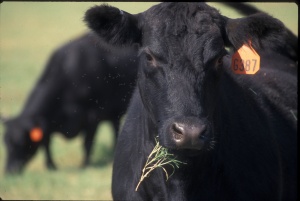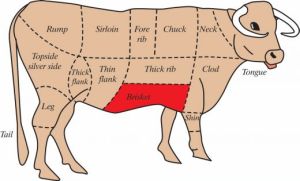Hay festival has been and gone and I feel I’m leaving a little enlightened as always. There were a few particularly relevant events which I ended up stewarding for which I’ll be writing about over the next few days.
Llwynberried Farm/ Beef Farm Visit
I feel that it is important if you are going to talk to anyone about being vegetarian/ vegan, which if you are one and ever leave the house you will, to get some basic facts right before you start. So this tour of a farm was a great opportunity to find out some facts to give my opinions some weight. It was interesting but very saddening to hear a beef farm talked about from a farmers perspective for a change.
So here I am in as an unbiased fashion as possible recounting some facts given to me.
The first and most frequently mentioned points were about the sustainability of beef farming. The farmers point was that they grow the food for the cows, (including wheat, barley, oilseed rape and forage maize,) which they then feed to the cows, which then poo, which is used for fertiliser. I am more than a little suspicious of this as the farmer still had to buy in supplement foods and fertiliser.
The farmers pointed out that the grass which cows feed on are carbohydrates which humans, chickens and pigs can’t digest but cows can.
 (Image from clemsonresearchfarms)
(Image from clemsonresearchfarms)
Interestingly the sweet smell of dried grass or hay in farmyards is lactic acid.
This year especially with all of the bad weather the farmers are running out of food early and so will have to send the cows off to slaughter earlier than they usually would.
Female cows can eat up to 4k of grass per day. This is the least economic change from feed to meat. In late life a male cow will put on 1.6k every day.
Beef takes up to 7k of feed to make only 1k of meat.
Chickens eat up to 4k of feed to make 1k of meat.
I have in my notes the words block grazing, so I assume this is how this farm manages its grazing. Block grazing is where a heard of cows are placed in a small segment of field to graze all of it before being moved to another section. Each cow needs 2 acres of space.
When a calf is born it spends 6 months with its mother. It is then weaned off and taken to grass or the food lots. A male calf will live on average 16 months. If a cow was allowed to live a full life outside of farming it would live between 15-20 years.*
Female cows live longer. They are allowed to live on average 10/11 years until they are either injured or stop breeding. A cow can begin to reproduce from around 6-9 months of age. She will have one calf a year. A cow will spend 6 months feeding her young, followed by 3 months of rest before being put out with a bull again.
So what’s the difference to a farmer between organic and non-organic? In a non-organic farm you can vaccinate cows against disease, use nitrogen fertilisers and chemicals to control weeds. You can’t do any of these things in an organic farm.
 (image from masterman535hubpages)
(image from masterman535hubpages)
So there we are, the main thing I took away from this visit is the lack of empathy within the industry for creatures.
The bulls were all ‘in to feed’, meaning in a barn, while the cows and calves were in a small mud pen during our visit. Though we could get up close and personal with their faces, the farmers spoke of the cows wholly as a product or food and at no point as an animal. At the end of the tour and talk almost all visitors tucked into a beef burger from the farm, and were told the date of it’s death. Still, if you’re going to eat it you should look into its eyes first.
*This point was not made at the talk but I felt I should add it to provide some balance here. To get this figure I simply Googled life span of a cow and used the average of all of the results.